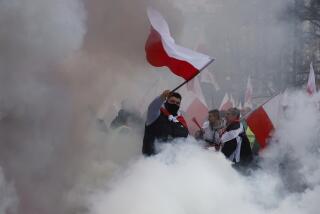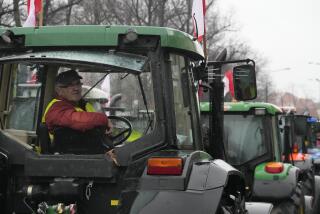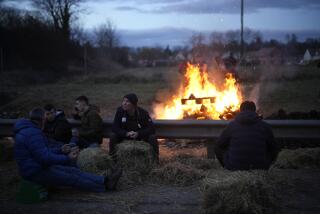Europe Farmers Protest Cuts, Denounce U.S.
- Share via
STRASBOURG, France — Angry European farmers burned an effigy of a U.S. trade negotiator, pelted police with paving stones and paraded anti-American signs through the streets of this Alsatian city Tuesday in a massive demonstration against an international reduction in agricultural subsidies proposed by the Bush Administration.
More than 50,000 farmers--including small delegations from far-away Japan and Korea who oppose opening their rice markets to American producers--marched several miles through Strasbourg and poured into an overflowing soccer stadium where they heard speakers denounce “dictatorial” American policies on farm subsidies.
The fight over subsidies, sparked by a recent U.S.-European Community clash on oilseeds, has brought the United States and its European allies to the brink of a trade war in recent weeks.
Several hundred protesters, their courage fueled by copious amounts of beer sold at sidewalk stands along the route, charged a cordon of police protecting the European Parliament building.
But they were repelled by anti-riot gendarmes who fired 200 tear-gas grenades into the ranks of demonstrators. More than a dozen police officers and protesters were injured during the daylong demonstration.
During another incident later in the day, a demonstrator lost a hand as a tear-gas grenade exploded when he attempted to hurl it back at police.
French organizers declared the demonstration a success, having managed to rally thousands of farmers from Germany, Italy and Switzerland to their side in the battle against a reduction in the relatively high subsidies received by European farmers compared with those received by their American, Canadian and Australian counterparts.
Luc Guyau, leader of a major French farmers’ union that called the demonstration, said the larger-than-anticipated turnout showed that all European farmers “are in the same boat. . . . They understand that no one is safe.”
The French farmers chose Strasbourg for the demonstration because it is on the country’s eastern border, just across the Rhine from Germany. By most accounts, Germany will play the key role in upcoming debate on the agricultural issues in Brussels and Geneva.
Significantly, among the demonstrators who filled the 40,000-capacity Meinau Stadium was a large delegation from German Bavaria, where farmers form the backbone of the Christian Social Union, a key political ally of German Chancellor Helmut Kohl’s Christian Democratic Party.
In a week charged with political encounters on the subsidy issue, the Bush Administration is counting on Kohl to put pressure on French President Francois Mitterrand in a meeting between the two leaders Friday in Bonn. On Monday, European foreign ministers and agricultural ministers are expected to meet in Brussels to discuss an accord reached Nov. 20 in Washington in negotiations between U.S. Trade Representative Carla Anderson Hills and EC Trade Representative Ray MacSharry.
Effigies of Hills and MacSharry were set ablaze in a huge bonfire lit in the Place de Bordeaux where the protest march began Tuesday morning.
Demonstrators from Korea, where markets are sealed from much cheaper American rice, carried signs in English declaring, “Rice Equals Korean Lifeline.” Delegations of German farmers arrived wearing bright red jumpsuits. Protesting Irish farmers were led by a kilted bagpiper. They carried signs with the names of their counties, including Donegal, Kildare and Limerick.
In the convoluted logic of many of the European farmers here, the United States is a greedy villain in the international agricultural marketplace. By urging a reduction in government agricultural subsidies, they say, the American government would force many European farmers off the land. “If prices get any lower on beef, I might just quit and open up a store,” said Bernard Roger, 45, who raises Charolais cattle in the Centre region of France near Bourges.
The subsidy issue is expected to come to a head in coming weeks as negotiators for an international GATT (General Agreement on Tariffs and Trade) treaty meet in Geneva.
Until Tuesday’s demonstration, the main opposition to the agricultural provisions of the GATT treaty had been in France, where the struggling Socialist government has threatened a veto of a related EC-U.S. accord on oilseed subsidies. Mitterrand indicated Monday evening he would wait until a complete world trade pact takes shape before deciding whether to try to veto the agricultural accord.
More to Read
Sign up for Essential California
The most important California stories and recommendations in your inbox every morning.
You may occasionally receive promotional content from the Los Angeles Times.













